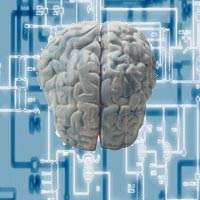Hi Gang,
This weekend alot of my thoughts on the whole topic of mind uploading started to solidify. I realized I don't like that phrase at all because the extraction of all the information that makes up you is not going to be achieveable without knowing the exact position of every single one of the more than 100 trillion connections and the local biochemistry for each part of your brain. My prediciton is that the more likely technology is going to look something like the slow replacement of biological tissue by silicon ideas put forth by Hans Moravec. This is not to say that eventually you won't be able to scan all these positions with robust nanotech, but I don't think this will be the course followed by the majority of people using this technology and robust nanotech is much farther off than the neural interfacing technology that will be available in 10-20 years.
I would like to use this forum to clarify my thoughts on this matter and make my arguments digestible to the general public. I'm quickly becoming an expert on neural interfacing and I am starting to be able to make some fairly reasonable predictions about where the technology is going and how fast it will get there. I would like to get some feedback, questions, or debate about these subjects here.
Best,
Ocsrazor















































